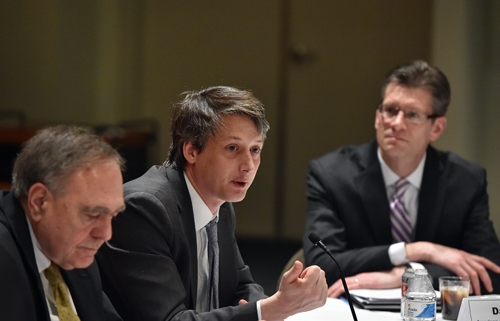You have /5 articles left.
Sign up for a free account or log in.

James Kvaal, center, addresses a meeting of the American Association of State Colleges and Universities in 2015.
AASCU
One of the architects of President Obama’s most significant higher education policies is resigning from the administration this week.
James Kvaal, a top White House adviser and former official at the U.S. Department of Education, is leaving to teach at the University of Michigan’s Ford School of Public Policy. His last day, after nearly seven years, is Friday, the White House said.
Kvaal was a driving force behind some of Obama’s higher education policy achievements, such as overhauling the federal student loan system and expanding income-based repayment for student loans. He was also a key player in the administration’s regulatory battle with for-profit colleges, its attempt at rating colleges and Obama’s plan for free community college.
“There are quite of a lot of accomplishments, and James Kvaal’s fingerprints are on all of it,” said Cecilia Munoz, director of the White House Domestic Policy Council.
Kvaal joined the administration in 2009 as a special assistant at the National Economic Council before becoming deputy secretary of education the following year. After a short stint on the Obama re-election campaign in 2012, Kvaal returned to the White House Domestic Policy Council, where he held his current post as its deputy director. Kvaal’s position at the Domestic Policy Council will be filled by Kate Kochman, who is currently its chief of staff.
“It is like a relay race,” Kvaal said of his time in the administration. “So there’s always unfinished business left behind.” A key part of that work that remains to be done, he said, was helping colleges find “more proven ways” to bring down costs for students and improving college completion rates.
Kvaal said he felt a “great sense of accomplishment” over the administration’s switch to direct student lending.
“That was arguably the biggest change that had ever been made in the student aid programs, and it was also a strong fight against a special interest,” he said. Banks and private lenders fought the legislation, which eliminated subsidies and guarantees to private student lenders.
He also said the administration’s boost to Pell Grant funding and its creation of the American Opportunity Tax Credit were the most “underappreciated accomplishments of this president.”
College Ratings
The Obama administration’s support for greater funding for higher education has won praise from college and university leaders. But Kvaal, at both the White House and the Education Department, also oversaw executive actions and regulations that often provoked backlash from some in higher education.
Kvaal was responsible for shaping and carrying out Obama’s sweeping college accountability proposals, which he announced in the summer of 2013. Most significantly, the administration said it was going to create a college ratings system to help families figure out which colleges offered the best value.
The pushback from college presidents and higher education associations against the college ratings -- which the administration said it eventually wanted to link to federal funding -- was swift and unrelenting. The White House eventually scaled back its ratings plan, releasing instead a trove of new data points about post-college earnings and loan repayment on its College Scorecard.
“Even when we disagreed with him, he always had an open door,” said Terry W. Hartle, vice president for government and public affairs at the American Council on Education, who praised Kvaal's “powerful intellect, long tenure and easygoing personality.”
Given Obama’s focus on higher education during his time in office, Hartle said, Kvaal “was in an unusually influential position. He helped establish the Obama legacy in higher education.”
Prior to his tenure in the White House, Kvaal worked in policy roles on Capitol Hill and in the second term of the Clinton administration.
Hartle recalled coming out of a meeting at the Education Department during the Clinton administration in which staffers told him, “We are being really nice to that James Kvaal guy because we think he’s going to be our boss someday.”
For-Profit Colleges
Kvaal also played an influential role in the Obama administration’s long-running duel with for-profit colleges. He helped craft the administration’s gainful employment rule, which cuts off funding for vocational programs that produce graduates with high debt compared to their earnings.
For-profit colleges lobbied heavily against the regulations and have filed lawsuits to block them. The latest iteration of the rules, which took effect last July, was upheld this week by a federal appeals court. Republicans in Congress are opposed to the regulations and have sought to defund them, so far unsuccessfully.
“Without question it was a difficult political challenge,” said Kvaal. “But at the end of the day it was a big step forward.”
Kvaal said there has been a “lot of change in the industry, and I think gainful employment is one reason for that -- it’s not the only reason.”
Free Community College
More recently, Kvaal helped craft Obama’s ambitious proposal to boost federal spending on community colleges so they can eliminate tuition for some students. He said he was pleased that 19 states or cities had proposed or started college promise programs since Obama unveiled his free community college plan in January 2015.
Both Democratic presidential candidates also have embraced the president’s proposal, though they’ve talked far more about their plans for tuition-free and debt-free college, which extend beyond community colleges.
“I think it’s healthy to get that attention on the campaign trail,” Kvaal said.
The administration’s plan drew inspiration from a Tennessee free community college program, which Randy Boyd, a Knoxville-based businessman and the state’s commissioner of economic and community development, helped develop.
Boyd recalled traveling to Washington in 2014 and meeting Kvaal at a gathering on college access. Boyd told Kvaal the Tennessee program could be a national model. “He was always very open and encouraging,” Boyd said.
Sara Goldrick-Rab, a professor of educational policy studies and sociology at the University of Wisconsin at Madison (and who will soon move to Temple University), whose work on free community college also influenced Obama’s plan, praised Kvaal in an email Thursday.
“He’s among the very best I have worked with in D.C.,” she said. “He is thoughtful and really listens. He's capable of entertaining bold ideas and thinking about how to make use of them.”
-- Paul Fain contributed reporting for this article.




